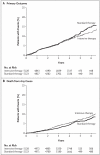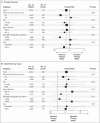Effects of intensive glucose lowering in type 2 diabetes - PubMed (original) (raw)
Randomized Controlled Trial
. 2008 Jun 12;358(24):2545-59.
doi: 10.1056/NEJMoa0802743. Epub 2008 Jun 6.
Hertzel C Gerstein, Michael E Miller, Robert P Byington, David C Goff Jr, J Thomas Bigger, John B Buse, William C Cushman, Saul Genuth, Faramarz Ismail-Beigi, Richard H Grimm Jr, Jeffrey L Probstfield, Denise G Simons-Morton, William T Friedewald
Collaborators
- PMID: 18539917
- PMCID: PMC4551392
- DOI: 10.1056/NEJMoa0802743
Randomized Controlled Trial
Effects of intensive glucose lowering in type 2 diabetes
Action to Control Cardiovascular Risk in Diabetes Study Group et al. N Engl J Med. 2008.
Abstract
Background: Epidemiologic studies have shown a relationship between glycated hemoglobin levels and cardiovascular events in patients with type 2 diabetes. We investigated whether intensive therapy to target normal glycated hemoglobin levels would reduce cardiovascular events in patients with type 2 diabetes who had either established cardiovascular disease or additional cardiovascular risk factors.
Methods: In this randomized study, 10,251 patients (mean age, 62.2 years) with a median glycated hemoglobin level of 8.1% were assigned to receive intensive therapy (targeting a glycated hemoglobin level below 6.0%) or standard therapy (targeting a level from 7.0 to 7.9%). Of these patients, 38% were women, and 35% had had a previous cardiovascular event. The primary outcome was a composite of nonfatal myocardial infarction, nonfatal stroke, or death from cardiovascular causes. The finding of higher mortality in the intensive-therapy group led to a discontinuation of intensive therapy after a mean of 3.5 years of follow-up.
Results: At 1 year, stable median glycated hemoglobin levels of 6.4% and 7.5% were achieved in the intensive-therapy group and the standard-therapy group, respectively. During follow-up, the primary outcome occurred in 352 patients in the intensive-therapy group, as compared with 371 in the standard-therapy group (hazard ratio, 0.90; 95% confidence interval [CI], 0.78 to 1.04; P=0.16). At the same time, 257 patients in the intensive-therapy group died, as compared with 203 patients in the standard-therapy group (hazard ratio, 1.22; 95% CI, 1.01 to 1.46; P=0.04). Hypoglycemia requiring assistance and weight gain of more than 10 kg were more frequent in the intensive-therapy group (P<0.001).
Conclusions: As compared with standard therapy, the use of intensive therapy to target normal glycated hemoglobin levels for 3.5 years increased mortality and did not significantly reduce major cardiovascular events. These findings identify a previously unrecognized harm of intensive glucose lowering in high-risk patients with type 2 diabetes. (ClinicalTrials.gov number, NCT00000620.)
2008 Massachusetts Medical Society
Figures
Figure 1. Median Glycated Hemoglobin Levels at Each Study Visit
I bars denote interquartile ranges.
Figure 2. Kaplan–Meier Curves for the Primary Outcome and Death from Any Cause
Figure 3. Hazard Ratios for the Primary Outcome and Death from Any Cause in Prespecified Subgroups
Data regarding glycated hemoglobin levels at baseline are presented for 10,288 patients because a baseline level was not available for 23 patients. Horizontal bars represent the 95% confidence interval, and vertical dashed lines indicate the overall hazard ratio. The size of each square is proportional to the number of patients.
Comment in
- Redefining quality--implications of recent clinical trials.
Krumholz HM, Lee TH. Krumholz HM, et al. N Engl J Med. 2008 Jun 12;358(24):2537-9. doi: 10.1056/NEJMp0803740. Epub 2008 Jun 6. N Engl J Med. 2008. PMID: 18539915 No abstract available. - Intensive glycemic control in the ACCORD and ADVANCE trials.
Dluhy RG, McMahon GT. Dluhy RG, et al. N Engl J Med. 2008 Jun 12;358(24):2630-3. doi: 10.1056/NEJMe0804182. Epub 2008 Jun 6. N Engl J Med. 2008. PMID: 18539918 No abstract available. - Glycemic targets and cardiovascular disease.
Cefalu WT. Cefalu WT. N Engl J Med. 2008 Jun 12;358(24):2633-5. doi: 10.1056/NEJMe0803831. Epub 2008 Jun 6. N Engl J Med. 2008. PMID: 18539919 No abstract available. - Intensive glucose control increased mortality and did not prevent cardiovascular events in type 2 diabetes.
Montori VM, Malaga G. Montori VM, et al. ACP J Club. 2008 Sep 16;149(3):6-7. ACP J Club. 2008. PMID: 18783183 No abstract available. - Intensive glucose control in type 2 diabetes.
Jenny-Avital ER. Jenny-Avital ER. N Engl J Med. 2008 Oct 2;359(14):1519; author reply 1520-1. doi: 10.1056/NEJMc081457. N Engl J Med. 2008. PMID: 18832252 No abstract available. - Intensive glucose control in type 2 diabetes.
Luan FL, Nguyen K. Luan FL, et al. N Engl J Med. 2008 Oct 2;359(14):1519-20; author reply 1520-1. N Engl J Med. 2008. PMID: 18837144 No abstract available. - Intensive glucose control in type 2 diabetes.
Tobey TA. Tobey TA. N Engl J Med. 2008 Oct 2;359(14):1520; author reply 1520-1. N Engl J Med. 2008. PMID: 18837145 No abstract available. - Is glucose normalization an evidence-based treatment for patients with type 2 diabetes mellitus?
Rydén L, Malmberg K, Mellbin L. Rydén L, et al. Nat Clin Pract Endocrinol Metab. 2009 Jan;5(1):8-9. doi: 10.1038/ncpendmet0997. Epub 2008 Oct 28. Nat Clin Pract Endocrinol Metab. 2009. PMID: 18957955 No abstract available. - [ACCORD and ADVANCE studies].
Sosnowski C, Janeczko-Sosnowska E. Sosnowski C, et al. Kardiol Pol. 2008 Sep;66(9):1013-7; discussion 1017-9. Kardiol Pol. 2008. PMID: 19004118 Polish. No abstract available. - Intensive glucose control increased mortality and did not prevent cardiovascular events in type 2 diabetes.
Montori VM, Malaga G. Montori VM, et al. Evid Based Med. 2008 Dec;13(6):168-9. doi: 10.1136/ebm.13.6.169. Evid Based Med. 2008. PMID: 19043027 No abstract available. - More is not always better: intensive glycemic control in type 2 diabetes.
Tuttle KR. Tuttle KR. Am J Kidney Dis. 2009 Jan;53(1):12-5. doi: 10.1053/j.ajkd.2008.11.001. Am J Kidney Dis. 2009. PMID: 19101398 No abstract available. - Intensive glucose control increased mortality and did not prevent cardiovascular events in type 2 diabetes.
Sherifali D. Sherifali D. Evid Based Nurs. 2009 Jan;12(1):12-3. doi: 10.1136/ebn.12.1.13. Evid Based Nurs. 2009. PMID: 19103831 No abstract available. - Preventing cardiovascular disease in type 2 diabetes: where do things stand with glycemic control? Part one.
Chait A. Chait A. Curr Diab Rep. 2009 Feb;9(1):7-8. doi: 10.1007/s11892-009-0002-0. Curr Diab Rep. 2009. PMID: 19192417 No abstract available. - Diabetes Control and Cardiovascular Risk: ACCORD, ADVANCE, AVOID, and SANDS.
Liebson PR. Liebson PR. Prev Cardiol. 2008 Fall;11(4):230-6. doi: 10.1111/j.1751-7141.2008.00006.x. Prev Cardiol. 2008. PMID: 19476576 No abstract available.
Similar articles
- Long-term effects of intensive glucose lowering on cardiovascular outcomes.
ACCORD Study Group; Gerstein HC, Miller ME, Genuth S, Ismail-Beigi F, Buse JB, Goff DC Jr, Probstfield JL, Cushman WC, Ginsberg HN, Bigger JT, Grimm RH Jr, Byington RP, Rosenberg YD, Friedewald WT. ACCORD Study Group, et al. N Engl J Med. 2011 Mar 3;364(9):818-28. doi: 10.1056/NEJMoa1006524. N Engl J Med. 2011. PMID: 21366473 Free PMC article. Clinical Trial. - Intensive blood glucose control and vascular outcomes in patients with type 2 diabetes.
ADVANCE Collaborative Group; Patel A, MacMahon S, Chalmers J, Neal B, Billot L, Woodward M, Marre M, Cooper M, Glasziou P, Grobbee D, Hamet P, Harrap S, Heller S, Liu L, Mancia G, Mogensen CE, Pan C, Poulter N, Rodgers A, Williams B, Bompoint S, de Galan BE, Joshi R, Travert F. ADVANCE Collaborative Group, et al. N Engl J Med. 2008 Jun 12;358(24):2560-72. doi: 10.1056/NEJMoa0802987. Epub 2008 Jun 6. N Engl J Med. 2008. PMID: 18539916 Clinical Trial. - Glucose control and vascular complications in veterans with type 2 diabetes.
Duckworth W, Abraira C, Moritz T, Reda D, Emanuele N, Reaven PD, Zieve FJ, Marks J, Davis SN, Hayward R, Warren SR, Goldman S, McCarren M, Vitek ME, Henderson WG, Huang GD; VADT Investigators. Duckworth W, et al. N Engl J Med. 2009 Jan 8;360(2):129-39. doi: 10.1056/NEJMoa0808431. Epub 2008 Dec 17. N Engl J Med. 2009. PMID: 19092145 Clinical Trial. - Glucose-lowering agents for treating pre-existing and new-onset diabetes in kidney transplant recipients.
Lo C, Jun M, Badve SV, Pilmore H, White SL, Hawley C, Cass A, Perkovic V, Zoungas S. Lo C, et al. Cochrane Database Syst Rev. 2017 Feb 27;2(2):CD009966. doi: 10.1002/14651858.CD009966.pub2. Cochrane Database Syst Rev. 2017. PMID: 28238223 Free PMC article. Updated. Review. - Empagliflozin for Type 2 Diabetes Mellitus: An Overview of Phase 3 Clinical Trials.
Levine MJ. Levine MJ. Curr Diabetes Rev. 2017;13(4):405-423. doi: 10.2174/1573399812666160613113556. Curr Diabetes Rev. 2017. PMID: 27296042 Free PMC article. Review.
Cited by
- Renal Complication and Glycemic Control in Korean Veterans with Type 2 Diabetes: A 10-Year Retrospective Cohort Study.
Kim YA, Lee Y, Seo JH. Kim YA, et al. J Diabetes Res. 2020 Jun 22;2020:9806790. doi: 10.1155/2020/9806790. eCollection 2020. J Diabetes Res. 2020. PMID: 32685562 Free PMC article. - From glucose lowering agents to disease/diabetes modifying drugs: a "SIMPLE" approach for the treatment of type 2 diabetes.
Mosenzon O, Del Prato S, Schechter M, Leiter LA, Ceriello A, DeFronzo RA, Raz I. Mosenzon O, et al. Cardiovasc Diabetol. 2021 Apr 28;20(1):92. doi: 10.1186/s12933-021-01281-y. Cardiovasc Diabetol. 2021. PMID: 33910583 Free PMC article. Review. - DPP-4 inhibition and neuroprotection: do mechanisms matter?
Shannon RP. Shannon RP. Diabetes. 2013 Apr;62(4):1029-31. doi: 10.2337/db12-1794. Diabetes. 2013. PMID: 23520281 Free PMC article. No abstract available. - [Diabetes in the elderly].
Meyer AK. Meyer AK. Z Gerontol Geriatr. 2012 Feb;45(2):109-16. doi: 10.1007/s00391-012-0293-7. Z Gerontol Geriatr. 2012. PMID: 22350392 German. - Cardio-metabolic risk prediction should be superior to cardiovascular risk assessment in primary prevention of cardiovascular diseases.
Rosolova H, Nussbaumerova B. Rosolova H, et al. EPMA J. 2011 Mar;2(1):15-26. doi: 10.1007/s13167-011-0066-1. Epub 2011 Mar 5. EPMA J. 2011. PMID: 23199124 Free PMC article.
References
- Goff DC, Jr, Gerstein HC, Ginsberg HN, et al. Prevention of cardiovascular disease in persons with type 2 diabetes mellitus: current knowledge and rationale for the Action to Control Cardiovascular Risk in Diabetes (ACCORD) trial. Am J Cardiol. 2007;99:4i–20i. - PubMed
- Selvin E, Marinopoulos S, Berkenblit G, et al. Meta-analysis: glycosylated hemoglobin and cardiovascular disease in diabetes mellitus. Ann Intern Med. 2004;141:421–31. - PubMed
- Gerstein HC, Pogue J, Mann JF, et al. The relationship between dysglycaemia and cardiovascular and renal risk in diabetic and non-diabetic participants in the HOPE study: a prospective epidemiological analysis. Diabetologia. 2005;48:1749–55. - PubMed
- American Diabetes Association Standards of medical care in diabetes — 2008. Diabetes Care. 2008;31(Suppl 1):S12–S54. - PubMed
Publication types
MeSH terms
Substances
Grants and funding
- N01HC95183/HC/NHLBI NIH HHS/United States
- Y01 HC001010/HC/NHLBI NIH HHS/United States
- N01HC95178/HC/NHLBI NIH HHS/United States
- N01-HC-95180/HC/NHLBI NIH HHS/United States
- Y01 HC009035/HC/NHLBI NIH HHS/United States
- IAA-Y1-HC-1010/HC/NHLBI NIH HHS/United States
- N01-HC-95183/HC/NHLBI NIH HHS/United States
- N01-HC-95178/HC/NHLBI NIH HHS/United States
- N01HC95182/HC/NHLBI NIH HHS/United States
- N01-HC-95179/HC/NHLBI NIH HHS/United States
- N01-HC-95181/HC/NHLBI NIH HHS/United States
- P30 NR005035/NR/NINR NIH HHS/United States
- N01-HC-95184/HC/NHLBI NIH HHS/United States
- N01HC95180/HC/NHLBI NIH HHS/United States
- N01HC95181/HC/NHLBI NIH HHS/United States
- N01HC95184/HC/NHLBI NIH HHS/United States
- N01-HC-95182/HC/NHLBI NIH HHS/United States
- IAA-Y1-HC-9035/HC/NHLBI NIH HHS/United States
- N01HC95179/HC/NHLBI NIH HHS/United States
LinkOut - more resources
Full Text Sources
Other Literature Sources
Medical
Research Materials


